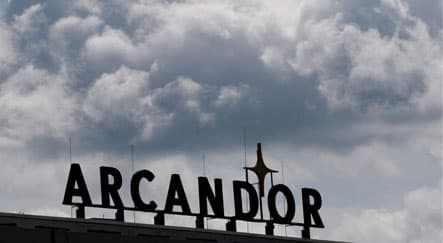Arcandor goes bust

Retail and tourism giant Arcandor said on Tuesday it had filed for bankruptcy, putting around 43,000 jobs at risk in Germany after Berlin dismissed its request for emergency state aid.
"Arcandor AG today filed with the Essen District Court to open insolvency proceedings due to threatening illiquidity," the statement said.
Travel agency Thomas Cook, in which Arcandor holds a 52-percent stake, "will remain unaffected by the insolvency proceedings," the statement added.
The group, which employs 70,000 people in Europe, two-thirds of whom work in Germany, said its department store chain Karstadt, as well as mail-order company Quelle, would also be affected by the insolvency.
On Monday, Berlin rejected the company's request for €650 million ($902 million) in state loan guarantees and €437 million in emergency loans but gave the firm one last chance to submit an improved bid.
But following an emergency meeting, the firm's board said it could no longer raise funds after the government rejected its plea for help.
"The insolvency application became necessary after Arcandor AG's requests for state loan guarantees and rescue aid were rejected and further requirements couldn't be fulfilled," the group said. "As a result the company had no further prospects for sustainable financing."
"Given the fact that loans in the amount of €710 million will shortly become due, the company will be threatened with insolvency as of 12 June 2009," the statement said.
The German government's decision not to intervene to save the firm followed its efforts two weeks ago to keep carmaker Opel and its 25,000 workers afloat with billions of euros in aid. Chancellor Angela Merkel has insisted, however, that Opel represented a "special case" and that Arcandor was in trouble already before the recession.
To qualify for funds from the so-called "Germany Fund" set up to help companies suffering in the economic crisis, firms must prove they were healthy before the financial crisis and have a solid plan for the future.
The chairman of Arcandor's board, Karl-Gerhard Eick, said: "Even as the insolvency proceedings are ongoing, we will continue to fight to save as many jobs and locations as possible."
Comments
See Also
"Arcandor AG today filed with the Essen District Court to open insolvency proceedings due to threatening illiquidity," the statement said.
Travel agency Thomas Cook, in which Arcandor holds a 52-percent stake, "will remain unaffected by the insolvency proceedings," the statement added.
The group, which employs 70,000 people in Europe, two-thirds of whom work in Germany, said its department store chain Karstadt, as well as mail-order company Quelle, would also be affected by the insolvency.
On Monday, Berlin rejected the company's request for €650 million ($902 million) in state loan guarantees and €437 million in emergency loans but gave the firm one last chance to submit an improved bid.
But following an emergency meeting, the firm's board said it could no longer raise funds after the government rejected its plea for help.
"The insolvency application became necessary after Arcandor AG's requests for state loan guarantees and rescue aid were rejected and further requirements couldn't be fulfilled," the group said. "As a result the company had no further prospects for sustainable financing."
"Given the fact that loans in the amount of €710 million will shortly become due, the company will be threatened with insolvency as of 12 June 2009," the statement said.
The German government's decision not to intervene to save the firm followed its efforts two weeks ago to keep carmaker Opel and its 25,000 workers afloat with billions of euros in aid. Chancellor Angela Merkel has insisted, however, that Opel represented a "special case" and that Arcandor was in trouble already before the recession.
To qualify for funds from the so-called "Germany Fund" set up to help companies suffering in the economic crisis, firms must prove they were healthy before the financial crisis and have a solid plan for the future.
The chairman of Arcandor's board, Karl-Gerhard Eick, said: "Even as the insolvency proceedings are ongoing, we will continue to fight to save as many jobs and locations as possible."
Join the conversation in our comments section below. Share your own views and experience and if you have a question or suggestion for our journalists then email us at [email protected].
Please keep comments civil, constructive and on topic – and make sure to read our terms of use before getting involved.
Please log in here to leave a comment.